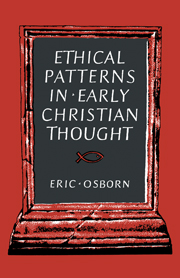2 - CLEMENT OF ALEXANDRIA
Published online by Cambridge University Press: 12 November 2009
Summary
Clement had already wandered far, when he came to Alexandria, looking for knowledge. He found the teacher he wanted in Pantaenus, a converted Stoic. After nearly thirty years in Alexandria, he left during the persecution of 202; this is probably the reason why his successor, Origen, who had strong ideas on martyrdom, never mentions him. We hear of him again in two letters written in 212 and 215. The first letter confirms his survival until 212. The second letter establishes his death prior to 215 for it speaks of him as one of ‘those blessed fathers who have gone before us’. His three main writings Protrepticus (Exhortation), Paedagogus (Instructor) and Stromateis (Miscellanies) form a progressive account of Christian knowledge. The Exhortation calls men to faith and salvation. The Instructor guides the believer to a Christian life. The Miscellanies present ‘gnostic notes concerning the true philosophy’, and have been the subject of much controversy. It seems likely that they represent the highest stage of Christian knowledge for their disordered contents are rich in thought and insight. They show the Christian philosopher or teacher as the ideal which determines Clement's own approach to life and morals. Clement discredits the gnostic heresy by putting forward a true form of gnosis.
Christianity did not come to terms with classical thought gradually. As with Judaism the decisive steps were taken quickly. During the second century the problems of converted intellectuals, of pagan ridicule and philosophic attack combined to make Christians insecure.
- Type
- Chapter
- Information
- Ethical Patterns in Early Christian Thought , pp. 50 - 83Publisher: Cambridge University PressPrint publication year: 1976



